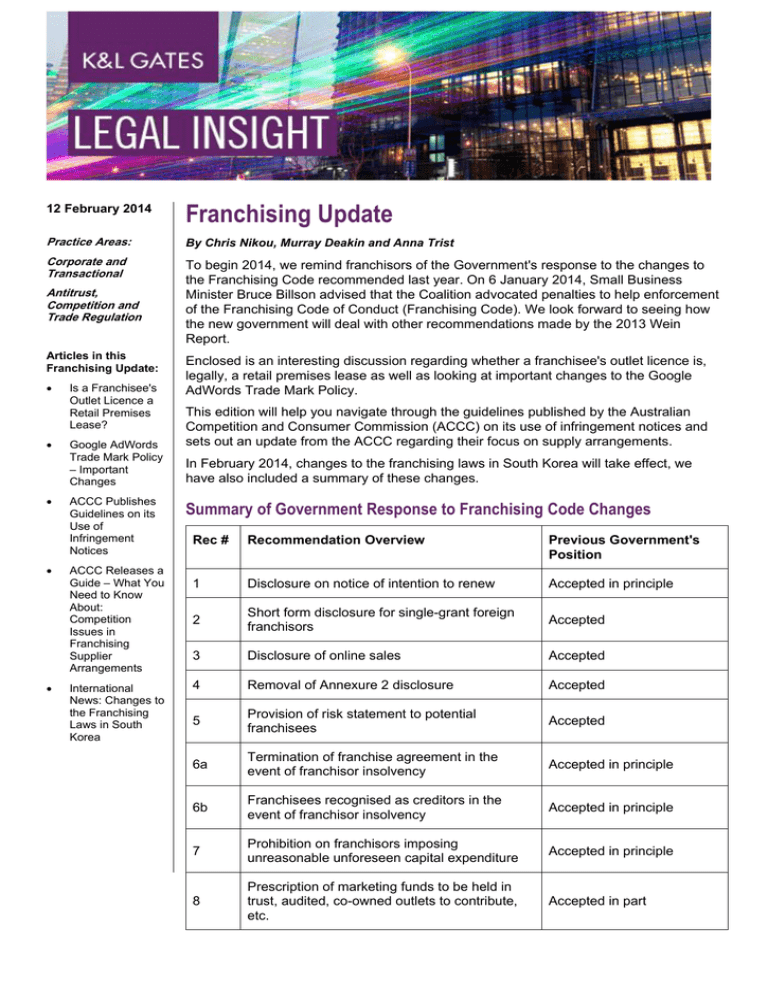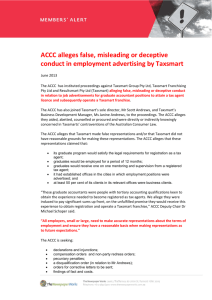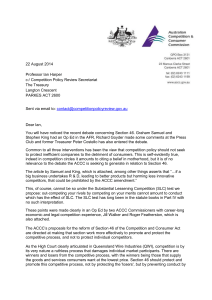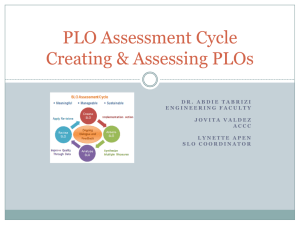
12 February 2014
Franchising Update
Practice Areas:
By Chris Nikou, Murray Deakin and Anna Trist
Corporate and
Transactional
To begin 2014, we remind franchisors of the Government's response to the changes to
the Franchising Code recommended last year. On 6 January 2014, Small Business
Minister Bruce Billson advised that the Coalition advocated penalties to help enforcement
of the Franchising Code of Conduct (Franchising Code). We look forward to seeing how
the new government will deal with other recommendations made by the 2013 Wein
Report.
Antitrust,
Competition and
Trade Regulation
Articles in this
Franchising Update:
Is a Franchisee's
Outlet Licence a
Retail Premises
Lease?
Google AdWords
Trade Mark Policy
– Important
Changes
ACCC Publishes
Guidelines on its
Use of
Infringement
Notices
ACCC Releases a
Guide – What You
Need to Know
About:
Competition
Issues in
Franchising
Supplier
Arrangements
International
News: Changes to
the Franchising
Laws in South
Korea
Enclosed is an interesting discussion regarding whether a franchisee's outlet licence is,
legally, a retail premises lease as well as looking at important changes to the Google
AdWords Trade Mark Policy.
This edition will help you navigate through the guidelines published by the Australian
Competition and Consumer Commission (ACCC) on its use of infringement notices and
sets out an update from the ACCC regarding their focus on supply arrangements.
In February 2014, changes to the franchising laws in South Korea will take effect, we
have also included a summary of these changes.
Summary of Government Response to Franchising Code Changes
Rec #
Recommendation Overview
Previous Government's
Position
1
Disclosure on notice of intention to renew
Accepted in principle
2
Short form disclosure for single-grant foreign
franchisors
Accepted
3
Disclosure of online sales
Accepted
4
Removal of Annexure 2 disclosure
Accepted
5
Provision of risk statement to potential
franchisees
Accepted
6a
Termination of franchise agreement in the
event of franchisor insolvency
Accepted in principle
6b
Franchisees recognised as creditors in the
event of franchisor insolvency
Accepted in principle
7
Prohibition on franchisors imposing
unreasonable unforeseen capital expenditure
Accepted in principle
8
Prescription of marketing funds to be held in
trust, audited, co-owned outlets to contribute,
etc.
Accepted in part
Franchising Update
Rec #
Recommendation Overview
Previous Government's
Position
9
Inclusion of an express obligation of good faith
in the Code
Accepted in part
10
Prohibiting franchisors from forcing franchisees
to opt out of ex-franchisee contact list
Accepted
11
Franchisor consent to resale subject to all
information being supplied by franchisee
Accepted in principle
12
Removing enforceability of restraint of trade
clauses under certain conditions
Accepted
13
Recognition of alternative dispute resolution in
addition to Office of Franchising Mediation
Advisor
Accepted
14
Prohibition of franchisor dispute resolutions
costs imposed on franchisees and litigation in
jurisdiction where franchisee operates
Accepted in principle
15a
Civil pecuniary penalties for breaches of the
Code
* Accepted in Principle by
the current Government
15b
ACCC to issue infringement notices for Code
breaches
Accepted
15c
Wider random audit powers for the ACCC
Accepted
15d
Disqualification as company director for serious
breach of the Code
Noted
15e
Court-ordered royalty holidays or payments to
marketing funds
Noted
16
Analysis of minimum terms for motor vehicle
dealerships
Accepted
17
No more reviews of the Code for minimum five
years
Accepted in principle
18
Improve clarity of policy intent in the Code, and
adopt minor technical changes
Accepted
2
Franchising Update
Is a Franchisee's Outlet Licence a Retail Premises Lease?
This article was written by Sam Hopper, Barrister. You can follow Sam's blog at
http://samhopperbarrister.com/
In a recent decision from the Supreme Court of Victoria, Croft J held that an arbitration
clause in a retail lease does not oust the Tribunal’s jurisdiction.
A detailed discussion of this issue can be found on Robert Hay’s blog here and here.
The Court also referred to a finding at first instance that the franchisee’s outlet licence is
in fact a sublease. This creates an interesting issue for practitioners acting for
franchisees, franchisors and their landlords.
A common arrangement for a franchise in Victoria involves the franchisor:
taking a head lease from the land owner
granting a franchise agreement and an ‘outlet licence’ to the franchisee.
In these arrangements, the franchisee is ordinarily not treated as a tenant of a retail
premises lease.
However, it is well established that an agreement in substance creating a lease will be
treated by the courts as a lease, even though the parties choose to call it a licence.
This was considered by the Tribunal in Ireland v Subway Systems Australia Pty Ltd &
Anor Retail Tenancies [2012] VCAT 1061 (Subway), in which Senior Member Riegler
quoted the colourful words of Lord Templeton in Street v Mountford:
"The manufacture of a five pronged implement for manual digging
results in a fork even if the manufacturer, unfamiliar with the English
language, insists that he intended to make and has made a spade."
After considering the text of the agreement, the surrounding circumstances and other
relevant authorities, the Tribunal concluded that the outlet licence in fact granted
exclusive possession to the franchisee and was a sublease.
If, as the Tribunal’s decision suggests, a franchisee’s outlet licence can be regarded as,
in substance, a sublease, the consequences could be significant.
For example:
the Retail Leases Act 2003 (Vic) (RLA) will almost always apply to the franchisee’s
outlet licence. That means, for example, that the franchisee is entitled to a disclosure
statement, an estimate of outgoings and a five year minimum term and that s 52 of
the RLA governs the franchisor’s repair and maintenance obligations
there is an interesting question over whether the head lease to the franchisor is a
retail premises lease for the purposes of the RLA
it is controversial whether a licensee (as opposed to a tenant) has standing to seek
relief from forfeiture if the licence is terminated. However, if the franchisee is in fact a
subtenant, then there is no doubt that it has standing to seek relief from forfeiture.
What happens if the terms of the franchise agreement are inconsistent provisions of the
RLA?
In the Subway case, Croft J refers to this problem and to the fact that the franchise
agreement in that case was with another entity within the franchisor's group of
companies. However, while expressing a view that the RLA may render specific
3
Franchising Update
provisions of a franchise agreement void if those provisions were inconsistent with
specific provisions of the RLA, His Honour did not need to finally resolve this question.
The point for practitioners to note at this stage is that a franchisee's outlet licence may
well be characterised as a sublease, which could give to the franchisee significant
leverage when the franchise agreement comes to an end. The extent of that leverage
will, as always, depend on the circumstances.
The Tribunal’s determination that the outlet licence was in fact a sublease was not
appealed and Croft J expressly left the question open.
Google AdWords Trade Mark Policy – Important Changes
Google has revised its AdWords trade mark policy which is currently in place in Australia,
Hong Kong, China, Macau, Taiwan, New Zealand, South Korea and Brazil. These
changes will come into effect on 23 April 2013. From this date, Google will no longer
remove third party advertisements which are triggered by keywords purchased for a
competitor's trade mark, unless the trade mark appears in the text of the resulting
advertisement.
Google AdWords are key words which are available for purchase through Google. When
a person conducts a Google search using a keyword which has been purchased by a
trader, then the trader's website and a small advertisement will appear in the sponsored
link section on the search results page.
Under the current Google AdWords complaint procedure, if a competitor is using your
trade mark without your approval as a keyword as part of its Google AdWords program
then you can file a complaint with Google to have the advertisement removed. For
instance, to take a hypothetical example, if Hugo Boss was to purchase 'Gucci' as a key
word so that a sponsored link for Hugo Boss appeared when a consumer conducted a
Google search using the search term 'Gucci', Gucci could have the sponsored link
removed through the Google AdWords complaint procedure. This is the case whether or
not the word 'Gucci' appears in the advertisement within the sponsored link section of the
search results or not.
From 23 April 2013, Google will no longer accept complaints on this basis. The effect of
this change is that a company can purchase a competitor's trade mark as a keyword to
have its advertisements displayed as a sponsored link where a consumer searches using
this keyword as long as the competitor's trade mark does not appear in the advertisement
itself. Any investigations acted on by Google prior to 23 April 2013 will no longer apply to
the relevant keywords after this date.
It is important to note that Google will still continue to monitor companies using a
competitor's trade mark as part of the advertisement displayed as a sponsored link.
Therefore, if you find that a competitor is using your trade mark as part of an
advertisement displayed as a sponsored link, then you can continue to use the Google
AdWords complaint procedure to have these advertisements removed.
If you want more information about the changes to the Google AdWords policy, or if you
have any queries about how these changes will affect you, then please contact us.
This article was written by Jonathan Feder, Partner, and Caroline Cossio, Senior
Associate, both of the Melbourne office.
4
Franchising Update
ACCC Publishes Guidelines on its Use of Infringement Notices
The Australian Competition and Consumer Commission (ACCC) has published much
needed guidance on its use of infringement notices issued under the Competition and
Consumer Act 2010 (Cth) (Act).
This guidance is timely because:
the ACCC has actively issued infringement notices to the business community, having
collected approximately AUD620,000 in penalties under infringement notices up to
December 2012
the amount of penalties sought by the ACCC under infringement notices has recently
increased by more than 50%.
A copy of the Guidelines, titled Guidelines on the Use of Infringement Notices
(Guidelines), can be found here.
What are Infringement Notices?
The ACCC has stated that infringement notices are designed to provide "a timely, cost
efficient enforcement outcome in relation to relatively minor contraventions of the Act".
The ACCC is empowered to issue infringement notices where it has 'reasonable grounds
to believe' that a person has contravened certain consumer protection provisions,
including:
unconscionable conduct provisions
unfair practices provisions (save for certain sections, such as misleading and
deceptive conduct provisions)
certain unsolicited consumer agreement and lay-by agreement provisions
certain product safety and product information provisions.
The ACCC may also issue an infringement notice to a person in relation to:
the failure to respond to a substantiation notice
the provision of false or misleading information to the ACCC in response to a
substantiation notice.
What are the Infringement Notice Penalties?
The penalty amount in each infringement notice will vary depending on the alleged
contravention, but in most cases is fixed for each individual contravention at:
AUD10,200 for a corporation (or AUD102,000 for a listed corporation)
AUD2,040 for an individual.
Different penalties apply in connection with substantiation notices.
Infringement notice penalties are calculated by reference to the value of penalty units set
by the Crimes Act 1914. In 28 December 2012, the value of a penalty unit increased from
AUD110 to AUD170. Therefore, the infringement notices relating to conduct prior to 28
December 2012 attracted lower penalties than what will now be recovered.
5
Franchising Update
How Active Have the ACCC Been in Issuing Infringement Notices?
Since April 2010, the ACCC has issued approximately 95 infringement notices and
received approximately AUD620,000 in penalties.
Examples of infringement notices issued by the ACCC include:
SingTel Optus Pty Ltd: 27 infringement notices totalling AUD178,000 in relation to
representations it made in the promotion of its 'Max Cap' mobile phone plans. The
ACCC's media release can be found here.
Foxtel Management Pty Ltd: seven infringement notices totalling AUD46,200 for
running a nationwide advertising campaign that the ACCC believed was misleading.
The ACCC's media release can be found here.
Advanced Lifestyle International Retail Pty Ltd: three infringement notices totalling
AUD19,800 in relation to false or misleading representations to consumers during inhome sales presentations for its massage wands, cushions, chairs and beds. The
ACCC's media release can be found here.
When Will the ACCC Likely Issue an Infringement Notice?
Issuing an infringement notice signifies that the ACCC considers a contravention of the
Act has occurred that requires a more formal sanction than an administrative resolution
(eg resolution of issue by agreement), but also believes the matter may be resolved
without legal proceedings.
However, an infringement notice is only likely to be issued in circumstances where the
ACCC would be willing to commence legal proceedings if the recipient of the notice
elected not to pay the infringement notice penalty.
The Guidelines indicate that the ACCC is more likely to consider the use of an
infringement notice in place of legal proceedings in the following circumstances:
the ACCC forms the view that the contravening conduct is relatively minor or less
serious
there have been isolated or non-systematic instances of noncompliance
there have been lower levels of consumer harm or detriment
the facts are not in dispute or the ACCC considers the circumstances giving rise to the
allegations are not controversial
infringement notices form part of the broader industry or sector compliance and
enforcement program following the ACCC raising concerns about industry wide
conduct.
What Are the Implications for Businesses?
Substantial Monetary Penalties
Despite criticism, the ACCC may continue its practice of issuing multiple infringement
notices where it considers it is appropriate to do so. This may occur where the ACCC
believes there have been multiple contraventions, where the contraventions have
occurred in multiple states or territories, where contraventions have involved different
types of media, or where it is considered desirable to deter similar conduct by the specific
6
Franchising Update
business involved or the broader industry. The payment of multiple infringement notice
penalties may result in payment of a substantial amount of money (especially given the
increase in penalty unit rates in December 2012).
Court Proceedings and Additional Remedies
There is no legal obligation on a recipient to pay an infringement notice. However, non
payment of infringement notice penalties will expose the recipient to the prospect of
proceedings arising from the ACCC's concerns. Infringement notice penalties are lower
than the maximum penalty a court could impose should the recipient be found to have
contravened the Act. In fact, should the ACCC be successful, the business may be liable
to pay a penalty of up to AUD1.1 million for each contravention in addition to legal costs.
Where appropriate, the ACCC may also seek additional remedies, including court
enforceable undertakings.
ACCC Infringement Notice Register and Media Releases
The ACCC operates a public Infringement Notices Register of paid infringement notices
on its website. Entries on the register ordinarily list the person or business that paid the
notice, the date paid and the section of the relevant legislation. Additionally, the ACCC
often issues a media release that confirms payment has been made and includes details
of the alleged matters and the amount paid. Given the affect this may have on a
businesses reputation, it is vital that all options are carefully considered prior to payment
of the penalty.
What Should a Business Do if it Receives an Infringement Notice?
When issued with an infringement notice, the recipient will be provided with information
including the nature of the alleged contravention, the amount to be paid and the period
for payment if the recipient wishes to avoid court action. On receipt of an infringement
notice, it is advisable for the business to obtain legal advice as to the appropriate
response.
There are a number of steps a recipient may take once they receive an infringement
notice:
Request an extension to comply with the infringement notice. The compliance
period for payment of an infringement notice penalty is 28 days. This may be
extended for a maximum of a further 28 days. Any extension request made to the
ACCC should be made as soon as possible.
Request that the infringement notice be withdrawn. If a business believes that
they have not engaged in the conduct alleged by the ACCC or there is additional
information the ACCC should consider, a recipient may request that the infringement
notice be withdrawn. Any withdrawal request must be provided to the ACCC as soon
as possible and it is advisable that the business obtains legal advice to maximise the
potential for a successful outcome. Any information provided to the ACCC in response
to an infringement notice should be carefully considered and must not be false or
misleading.
Pay the infringement notice penalty. Payment of the infringement notice is not
taken to be an admission of wrong doing by the recipient and involves no court finding
of any contravention of the Act. Further, the ACCC cannot commence court
proceedings in relation to the alleged contravention. However, this does not impact on
7
Franchising Update
the rights of action other parties may have against the recipient and the recipient
should consider the possible implications of paying the penalty, as discussed above.
Not pay the infringement notice penalty. There is no legal obligation on a recipient
to pay an infringement notice. However, nonpayment of an infringement notice during
the compliance period will expose the recipient to the prospect of ACCC initiated court
proceedings in relation to the alleged contravention detailed in the infringement notice
once the compliance period expires. The recipient should seek legal advice before
taking such action (or inaction).
This article was written by Murray Deakin, Partner, and Joni Jacobs, Lawyer, of the
Sydney office.
ACCC Releases Guide – What You Need to Know About: Competition
Issues in Franchising Supplier Arrangements
The ACCC recently released a guide entitled What You Need to Know About:
Competition Issues in Franchising Supplier Arrangements (Guide). A link to the full
version of the Guide can be found here.
The Guide is aimed at assisting franchisors and franchisees to understand the ACCC's
role in reviewing arrangements where franchisees are required to purchase goods or
services from particular suppliers. It warns against third line forcing, which breaches the
Competition and Consumer Act 2010 (Cth) (Act) even if the conduct does not harm
competition.
Third Line Forcing
The Guide sets out a definition of third line forcing. It provides that third line forcing
occurs where a supplier (eg a franchisor) supplies goods or services (eg franchising
services or the right to become a franchisee) on the condition that the customer also
acquires goods or services from another person or business (unrelated to the supplier).
The Guide acknowledges that franchisors:
set objective quality standards and allow individual franchisees to source goods or
services from any supplier that meets those standards
require franchisees to purchase goods or services from the franchisor or a related
company.
Concerns arise under the Act with these kinds of arrangements only where the
arrangement has the purpose or likely effect of substantially lessening competition. The
ACCC has commented that competition is unlikely to be substantially affected where the
franchisee's market and other suppliers' markets include a number of competing
businesses. Specific legal advice should be sought regarding whether an arrangement
has the purpose or likely effect of substantially lessening competition.
Notification
The guides sets out the notification process, which will provide franchisors with protection
from legal action under the Act (after a notification is validly lodged with the ACCC, the
franchisor has statutory protection to engage in the third line forcing conduct which
protection commences after 14 days unless the ACCC takes steps to prevent this).
8
Franchising Update
A notification should be lodged by franchisors:
who intend to require franchisees to purchase goods or services from nominated
suppliers
whose supplier arrangements may have the purpose or likely effect of substantially
lessening competition.
The ACCC may remove the protection from legal action provided by a notification at any
time if it is satisfied that the likely public benefits will not outweigh the likely public
detriments from the conduct. This action is known as 'revoking' the notification and in
relation to third line forcing notifications for franchising supplier arrangements, such
action is rarely taken.
What Will the ACCC Consider
The guide outlines that the ACCC will consider the public benefits and public detriments
including the impact of the conduct on the entire community and not just the impact on
individual franchisees.
In considering the public benefits, the ACCC looks at factors such as:
whether there is consistency across the franchise system, which may benefit
customers and increase the value of the franchise system as a whole
more efficient operation and management of the franchise system where all
franchisees operate compatible equipment and purchase the same goods
more efficient and effective bargaining between the franchise group and its suppliers,
which may result in:
o improved non price terms of the supply contract (eg specific service levels or
changes to the supplier's usual method of delivery)
o cost and time savings as franchisees will not need to individually search for and
negotiate deals with suppliers.
In considering the public detriments, the ACCC looks at factors such as:
supplier arrangements which do not benefit the franchise group as a whole and are
less efficient than if the franchisee were not subject to those restrictions
less competition in a relevant market, such as the markets in which franchisees
operate or the markets in which suppliers of goods or services to the franchisee
compete.
Rebates
Often, franchisors receive a rebate from suppliers as a result of their supply arrangement.
The existence of the rebate, the ACCC has advised, does not automatically constitute a
public detriment in the ACCC's assessment of a notification. In fact, the Guide provides
that "there is no outright prohibition against rebate arrangements".
Under the Franchising Code of Conduct however, franchisors are obliged to disclose to
franchisees:
9
Franchising Update
whether they will receive a rebate or financial benefit from the supply of goods or
services to franchisees
the name of the business providing the rebate or financial benefit
whether the rebate is shared directly or indirectly with franchisees.
Franchisors are not obliged to disclose the value of the financial benefit.
Franchisors are not obliged to distribute amongst franchisees the financial benefit they
receive.
The ACCC may consider the matter of rebates as part of its broader assessment of
public benefits and public detriments. The ACCC does not however, consider it to be
their role to reach a conclusion regarding whether a supplier arrangement offers the best
value for franchisees (that is a matter for franchisees to consider when conduct their due
diligence in respect to the franchise system).
Conclusion
In the Guide, the ACCC encourages:
franchisees (and prospective franchisees) to discuss with franchisor any concerns
they have regarding supplier arrangements
franchisors to consult with franchisees:
o when putting in place supplier arrangements which restrict how franchisees
purchase goods and services or change the way in which the supplier
arrangements operate
o to consider the costs and benefits for the franchise group as a whole when
selecting nominated suppliers
o and to explain to franchisees the process that the franchisor has undertaken in
selecting suppliers and the reasons for any changes
o and to monitor nominated suppliers to ensure that arrangements continue to
deliver value either through lower prices or increased quality to the franchise group
as a whole.
franchisors to make supplier arrangements transparent to both prospective and
existing franchisees (beyond the minimum requirements set out in the Franchising
Code of Conduct).
The Guide provides a useful summary of the law in relation to supplier arrangements in
franchise systems, but franchisors should seek specific legal advice in relation to their
particular supplier arrangement.
This article was written by Anna Trist, Senior Associate, of the Melbourne office.
International News: Changes to the Franchising Laws in South Korea
A Presidential Decree is expected to be issued shortly to provide further guidance
regarding South Korea's amendment to the Fair Transactions in Franchise Business Act
(South Korea's franchise legislation). The amendments will be effective from February
2014.
10
Franchising Update
Generally speaking, the amendments address franchise relationship issues and require
increased disclosure.
Key aspects of the amendments are:
franchisors must share remodelling costs in some circumstances
reducing business hours under certain circumstances (eg permitting franchisees not
to operate the franchised business during night hours where the cost of operating the
business exceeds the profits generated by that operation or other unavoidable
circumstances exist)
protection of a franchisee's territory (effective from August 2014)
large franchisors to provide additional information to franchisees including information
regarding projected sales revenue and the calculation methods for those projections
increased penalties and fines against franchisor who provide false, exaggerated or
misleading information (up to approximately US$285,300)
additional protection for franchisees (by permitting franchisees to form trade
associations or similar organisations to protect their rights by allowing them to consult
and negotiate with the franchisor on a collective basis)
refunds to franchisees of franchise fees in certain circumstances
increased oversight for violation of the laws.
South Korea's franchise legislation has not been amended since 2010 (after
becoming law in 2002 and being amended in 2008). The amendments are a
substantial shift in South Korea's legislation towards protecting franchisees and
should be considered when seeking to open a franchise system in South Korea or in
any existing operation of a franchise system in South Korea.
This article was written by Anna Trist, Senior Associate, of the Melbourne office.
Authors:
Chris Nikou
Murray Deakin
chris.nikou@klgates.com
+61.3.9640.4354
murray.deakin@klgates.com
+61.2.9513.2335
Jonathan Feder
Anna Trist
jonathan.feder@klgates.com
+61.3.9640.4375
anna.trist@klgates.com
+61.3.9640.4381
Caroline Cossio
Joni Jacobs
caroline.cossio@klgates.com
+61.3.9640.4247
joni.jacobs@klgates.com
+61.2.9513.2463
11
Franchising Update
Anchorage Austin Beijing Berlin Boston Brisbane Brussels Charleston Charlotte Chicago Dallas Doha Dubai Fort Worth Frankfurt
Harrisburg Hong Kong Houston London Los Angeles Melbourne Miami Milan Moscow Newark New York Orange County Palo Alto
Paris Perth Pittsburgh Portland Raleigh Research Triangle Park San Diego San Francisco São Paulo Seattle Seoul Shanghai
Singapore Spokane Sydney Taipei Tokyo Warsaw Washington, D.C. Wilmington
K&L Gates practices out of 48 fully integrated offices located in the United States, Asia, Australia, Europe, the Middle East and
South America and represents leading global corporations, growth and middle-market companies, capital markets participants and
entrepreneurs in every major industry group as well as public sector entities, educational institutions, philanthropic organizations
and individuals. For more information about K&L Gates or its locations, practices and registrations, visit www.klgates.com.
This publication is for informational purposes and does not contain or convey legal advice. The information herein should not be used or relied upon
in regard to any particular facts or circumstances without first consulting a lawyer.
©2014 K&L Gates LLP. All Rights Reserved.
12





